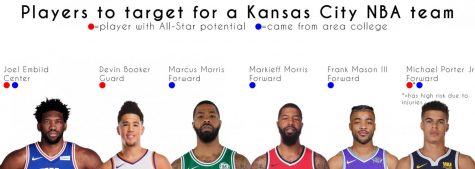Kansas City NBA team could work out
April 1, 2019

In May 2018, an anonymous National Basketball Association (NBA) executive told Jarrett Sutton of SEC Network that “Kansas City will get an NBA team at some point.”
But should Kansas City get an NBA team? Kansas City used to have a team before they relocated and became the Sacramento Kings, and this was probably for the best.
The Cincinatti Royals relocated to Kansas City in 1972 and renamed themselves the Kansas City-Omaha Kings, due to the fact that Kansas City already had the Royals Major League Baseball (MLB) team and that they split home games between Kansas City and Omaha for the first six years.
When they stopped playing home games in Omaha, the team dropped “Omaha” from their name and called themselves the Kansas City Kings, until they moved to Sacramento in 1985.
The team moved to Sacramento due to a change in ownership in 1983. One of the buyers at the time, Gregg Lukenbill, said that they wanted to improve the team’s performance and boost attendance, while also assuring the previous owners to keep the team in Kansas City. The previous season, they ranked 17th out of the 23 NBA teams at the time in attendance and failed to make the playoffs.
A interview with Joe Benvenuti, another one of the buyers, revealed that the ownership group might have always planned on relocating the Kings to Sacramento, regardless of attendance.
Whether or not there was an ulterior motive to move the Kings to Sacramento, attendance was abysmally low. In their final season, the Kansas City Kings only averaged 6,410 home game attendees. This can be attributed to not just their poor performance in the early ‘80s, but also the Royals’ pursuit of a World Series and the increasingly popular Kansas City Chiefs.
A Kansas City-based NBA team cannot succeed if they cannot put people in seats, and in order for them to do so, they will need to have a decent stadium and a team that can win in the playoffs. The Sprint Center, located in downtown Kansas City, already hosts college basketball games and hosted a few NBA preseason games, so very few adjustments would need to be made to make the Sprint Center suitable for an NBA team.
Creating a strong playoff team would be the real challenge because the team would have to get a star player or two to come to Kansas City, which could be a turnoff for potential players.
In addition to having a strong playoff team, this hypothetical Kansas City team should also try to appeal to the area’s love for college basketball because doing that would also increase attendance at home games.
The team should try to work out a deal to bring Bill Self, University of Kansas (KU) mens basketball head coach, on as a head coach and get a few talented players from local colleges along with a fan favorite onto the team, such as KU alumni Joel Embiid, Philadelphia 76ers center; Markieff Morris, Thunder forward; Marcus Morris, Celtics forward and Frank Mason III, Kings guard. An NBA team would need to relocate to Kansas City to make this work. If the NBA were to expand, it risks diluting the talent found in the NBA which can hurt the whole league. The best teams to relocate would probably be the Orlando Magic and the Memphis Grizzlies, in that order.
Moving the Orlando Magic to Kansas City would help them out because the Magic are overshadowed by Disney World and Universal Orlando Resort. However, this would probably create some league misalignment as a Kansas City team would probably play in the Western Conference. This would not happen if the Memphis Grizzlies, a Western Conference team, relocated to Kansas City.
The soonest a team could relocate to Kansas City and have some success would probably be the 2023-2024 season. Both the Magic and Grizzlies do not have salary to pay out in that season and Embiid, who is critical to the success of the organization, would be an unrestricted free agent, given he does not sign an extension by then.
Even if this works and an NBA team is brought to Kansas City, this could potentially be too much for the Kansas City sports market, lowering another team’s attendance and forcing that team to move.

Cj • Feb 8, 2020 at 10:23 pm
Kansas City is a great sports town that does not have a winter sport. The winters are long and cold and this city would rally behind an nba team. The reason the kings left is they competed with the misl comets which sold out every night. That along with Kempers roof collapse and the nba was not what it is today in 1984. Thus was the pre Jordan era when playoff games were tap delayed. I already have the name for the new team the monarchs.
Randal Lux • Jun 20, 2019 at 7:20 pm
Kansas City would be able to hold a basketball team. Remember Kansas City has a long usually cold weather during basketball season so in door sports are what would bring people out and even more if the team really had players who were good people would come. So YES , Kansas City should be give a Team.